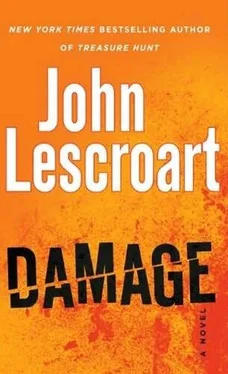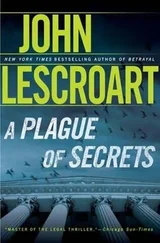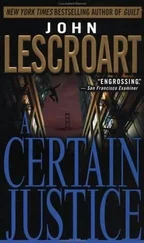When the Curtlees realized this, they set out to destroy her husband, and nearly succeeded. At the time, he’d worked for one of the city’s big law firms as a word processing supervisor, a daytime job that left him time for his painting. The Curtlees had connections with the people he worked for and Durbin got accused of a lot of mischief-stealing supplies from the storeroom, using the firm’s computers for his own work-until he got fired. He received no severance after seven years of employment and was told he was lucky they weren’t prosecuting him criminally.
Finally, after a Courier article on Durbin the hypocrite vigilante and now thief who’d railroaded Ro Curtlee into jail, he found himself blackballed in the legal firms and couldn’t get work for almost a year. Couldn’t find the heart to get back to his painting.
Janice sighed. “I think having to abandon the painting was the hardest thing.”
“That was a bad time,” Kathy said. “I’d almost forgotten all about it. And his painting.”
“Well, Michael hasn’t. He’s never really come to grips with having to quit that.”
“Three kids,” Kathy said.
“I know. But still…” Her mouth tightened at the memory. “It’s a miracle he eventually got the UPS franchise, somehow under the Curtlees’ radar. At least we thought they were more or less forever out of our lives.”
“They’re not?”
“They might be. We hope so. But maybe not.”
“Why not?”
“Because last week some idiot judges let Ro out of prison on appeal, and another moron of a judge here in town gave him bail while he’s waiting for a retrial, and now he’s out. Ro, the convicted murderer, walking around free as a bird. And Michael’s thinking it’s all going to start again, that everything he went through, everything we went through, was all just in vain. And the idea, as I said, just paralyzes him. If Ro’s out again, then Michael’s stand with the jury basically made no difference. It was all just a big cosmic joke.”

Out in the street, Michael Durbin took the hike from his younger boy, Peter.
When they’d been choosing up sides, Durbin had almost as a matter of course chosen Peter to be his teammate against Uncle Chuck and Jon. Both boys were athletic, but Jon had an indefinable special something as well as-much as he tried to deny and even hide it-a special place in Durbin’s heart. Though he loved both of his sons and tried to treat them exactly equally, Durbin and his firstborn shared a natural simpatico and deep connection that Durbin knew might prove hurtful to his very sensitive younger son if he let down his guard and inadvertently revealed his instinctual favoritism.
It was a lifelong struggle.
So whenever he got the chance-as here choosing who would be his teammate-Durbin leaned over backward to pick his younger son over his older. He knew that Jon intuitively understood why Durbin did this, why he almost always appeared to favor Peter. The insecure younger boy needed the overt signs, the trappings of his father’s love and approval. Jon did not. It wasn’t something he and his dad had to talk about. They simply “got” each other.
Now Durbin faded to his left with the football as his brother-in-law, Chuck, started counting to five at the scrimmage line and Peter raced down the street, cutting first right, then left, trying to shake his brother Jon’s coverage. When Durbin saw Peter cut back again, gaining a step on Jon, he threw a high arching spiral that led his younger boy perfectly.
Or almost perfectly.
Jon jumped and with a cry of jubilation came down with the ball. Putting a move on Peter, he shook him and then sprinted up the street, yelling for Chuck to “block him, block him, block him,” meaning Durbin.
But Durbin feinted right, left, right again and broke around Chuck, then got enough in front of Jon to slow him down a step, which in turn allowed Peter to come up from behind Jon and get him just as Durbin reached him, too. Even though they were playing touch football, Durbin threw his arms around his beloved son and held him in a hug for a full second, maybe two.
Contact.

All the kids having dispersed to the television room at the other end of the house, the adults found themselves sitting around the Novios’ now-cleared dining room table, everyone drinking Frangelico out of snifters.
“You really think he still cares?” Chuck was asking.
“He’s done ten years in the slammer,” Michael said. “That’s a long time to think about getting back at who put you there.”
Chuck sipped and nodded. “It’s also a hell of a long time to hold a grudge, don’t you think?”
Michael shrugged. “I don’t think there’s a statute of limitations on grudges.”
“Yes, but,” Kathy said, “it seems to me that these Curtlees did what they did back when all this was fresh in their minds and Ro just recently convicted, but now that he’s out of prison, who cares about anybody who helped send him there? You’re not a threat to him anymore.”
Janice threw a look at her husband across the table. “That’s what I told him, too.”
Michael looked from one sister to the other. “And I hope you’re both right. But even if you are right about his parents, there’s still Ro himself.”
Chuck was shaking his head. “I don’t see that. He’s not going to do anything except be a good boy while he waits for his new trial.”
Michael swirled the liqueur in his glass. “I don’t think so. He can’t be a good boy. He doesn’t know how.”
“Michael,” his wife said, “how can you know that?”
“I can know it because I heard him testify at his trial. I mean, here’s this serial rapist on the witness stand trying to convince us that he was in fact in a normal relationship with the woman he killed. They were having consensual sex. What was the big deal?”
“Maybe they were,” Kathy said.
“They were not, I promise. She’s eighteen, just off the boat, scared to death, and she’s living under his roof on a work visa that the Curtlees can pull anytime they want. Then Ro wants to have sex with her? So whatever it was, it wasn’t consensual.”
“Still,” Chuck said, “it might not necessarily have been rape, right? I mean, she could have been coerced, but felt she had to.”
“Chuck,” Kathy said, “that’s still rape.”
“I’m just saying, maybe not technically, legally.”
Michael nodded. “Don’t tell that to the other two ex-housekeepers who testified. Who said that Ro had a thing about them keeping their shoes on.”
“That’s just weird,” Kathy said.
“Why did he have them do that?” Chuck asked.
Michael shook his head. “Nobody knows. He’s a nutcase. But they both said it.”
“And this means?” Chuck asked.
“It means Ro’s guilty as hell if Dolores Sandoval was naked except for her shoes. And she was. So it wasn’t consensual sex. It was a rape and then when she started screaming, he had to shut her up. There’s no other way to interpret it.”
“What about the other two women?” Kathy asked. “The ones who did testify?”
“What about them?”
“I mean, what did he say about them, their testimony?”
“He just said they were lying. He’d never had sex with either of them, much less raped them. He was just being set up. Why? Who knew? By whom? He didn’t know. There was just a lot of prejudice out there in the world against people who had money.”
“But,” Chuck came in again, “my point is, Michael, this guy Ro isn’t going to come after you. You’re no part of his new trial, right?”
Читать дальше














